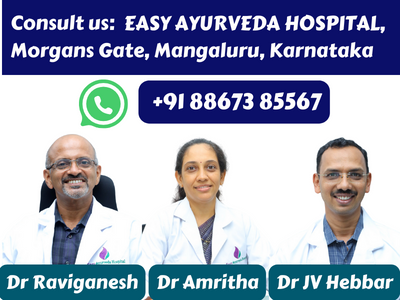Article by Dr Raghuram Y.S. MD (Ay) & Dr Manasa, B.A.M.S
Abhakta is one of the ‘aushadha sevana kala’ i.e. time for taking medicine.
Abhakta = A + Bhakta
A = no, Bhakta = food
So, in Abhakta, the medicine is administered when the person / patient has not taken food. This also means that the person has an empty stomach when he or she is taking the medicine.
Abhakta is also called by other names –
Ananna = Na + Anna = no food = medicine taken when he or she has not consumed food
Niranna = without food – medicine should be taken without having taken the food
All these terms mean the same.
Understanding Abhakta Annakala
When is the medicine administered in ‘Abhakta’?
As already mentioned, the medicine in Abhakta is administered to a person who has not consumed any food or when the stomach is empty / devoid of any food.
In which part of the day the medicine is administered?
Usually, this medicine is meant to be given early in the morning. At this time, the person has just woken up from sleep. He should be allowed to avoid his urine and faeces so as to feel lightness in the gut, as felt after complete evacuation of bowel.
He or she should be instructed not to take any food and keep the stomach empty.
The other preferable time is at / during sunrise.
Why should medicine be given at this time? Dosha relation
At this time i.e. early in the morning or during early morning, the dosha activities will be very less in the stomach and gut. The medicine will not be influenced by the dosha or doshas.
When the stomach is empty, the stomach will be free from kapha dosha or its influence.
This time can be considered as ‘breakfast time’ nowadays. So, if not early in the morning or at sunrise, medicine can be administered at an alternative time i.e. breakfast time. Even here, the stomach will be empty as per rule.
Indications and benefits of Abhakta
Medicinal efficacy – When the medicine is administered on empty stomach, its therapeutic effect will be high and good.
Absorption – The absorption and action of the medicine administered on an empty stomach will be optimum.
Shodhana – The medicines which are directed towards inducing therapeutic emesis – vamana and therapeutic purgation – virechana should be administered at this time. When done, they will set in the action quickly and induce vomiting or purgation effortlessly.
Weight Reduction – If the patient is looking for weight reduction, the medicines administered at this time will help in achieving the goals. Therefore, Abhakta medicine is the best one for management of overweight and obesity conditions. So, it can be considered in medovaha sroto dushti i.e. contamination of fat forming and conveying channels in the body and diseases caused by the same.
Medicines for morbid kapha and pitta and diseases caused by them – Medicines given on empty stomach will help in combating morbid pitta and kapha. It is also the best to treat and take under control the diseases caused by aggravated pitta, kapha or both doshas.
Kapha and Pitta are drava doshas i.e. they are partly liquid in nature. Putting it the other way, dravatva or presence of liquidity is one of the qualities of both pitta and kapha. Langhana i.e. fasting or therapeutic starvation, as we know, when done in a controlled way, will remove the excessive fluidity of pitta and kapha, which are antagonistic to the metabolism and metabolic fire – the agni.
Here, the empty stomach will provide a similar environment and added by the effect of anti-pitta or anti-kapha medicines administered at this time, the therapeutic effect in combating morbid kapha and pitta will be optimum. Same things work in favour of treating kapha and pitta disorders.
Ideal for Vyana Vata dysfunctions – Medicines given early in the morning on empty stomach are best in treating vyana vayu dysfunctions and also disorders caused due to vitiation of vyana vata. Vyana vata is the subtype of vata which is involved in distribution of things, including nutrition and oxygen and circulation in the body. It is constantly moving all around the body. Medicines administered in Abhakta time will help in balancing vyana vata and curing the diseases caused by dysfunctions of vyana vata.
Persons who have good strength are fit / eligible to take medicine in the abhakta time. This includes good physical and mental strength. People who have less strength and less tolerance will not tolerate medicines given on an empty stomach.
Contraindications for giving medicines in Abhakta Kala
High potency medicines – Medicines having higher potencies shall be given on empty stomach to those who are strong but not the patients who are weak. It should also not be given to children, aged people, women or debilitated persons.
Those having tiredness and weakness – Medicines given on empty stomachs at this time can cause tiredness and weakness. Therefore, the dose and tolerance should be monitored regularly. Also, medicine at this time should not be given to those who already have tiredness and weakness.
The other conditions wherein abhakta aushadha is contraindicated are –
– People who are thirsty
– People who are hungry
– People who have consumed cold water
– People suffering from indigestion
We need to observe that though this form of medicine is given on an empty stomach, care should be taken to see that the person should not be feeling hungry or thirsty while administering medicine. So, the rule is – this medicine should be given to a person who is on an empty stomach but is neither hungry nor thirsty.
Cold water meddles with the action of the medicine by not only diluting the medicine but also the agni. It will also increase kapha and vata.
When medicine is given to those suffering from indigestion, during this time, the medicine will be overcome by ama. The medicine will not be absorbed properly and put into circulation due to the weakness of agni.
Some diseases which can be cured by medicines administered in Abhakta state
Abhakta medicinal timing can be considered in the below mentioned conditions –
– Circulatory diseases like hypertension / hypotension caused due to imbalances of vyana vata
– Skin diseases – due to deficiency of nutrition and oxygenation due to vyana vata imbalances
– Kapha disorders – diabetes, swelling / oedema in body parts, heaviness of the body etc.
– Pitta disorders – inflammatory diseases, gastritis, colitis, arthritis etc.
– Obesity and overweight issues
– Diseases of fat related channels and errors of fat metabolism, Hypothyroidism
– Shodhana Sneha – the quantity of medicated ghee / oil used in metered doses, until the body gets saturated with the medicine and signs of proper oleation / lubrication are found, for preparing the person for shodhana – cleansing of the body is given to the patient on empty stomach when he or she has not consumed any food yet.
References
– Ashtanga Sangraha Sutra Sthana, Chapter 23 (23/14, 23)
– Sushruta Samhita Uttara Sthana, Chapter 64 (64/67)
– Charaka Samhita Chiktsa Sthana, Chapter 30 (30/299)
– Sharangadhara Samhita Madhyama Khanda, Chapter 2 (2/2,4)















